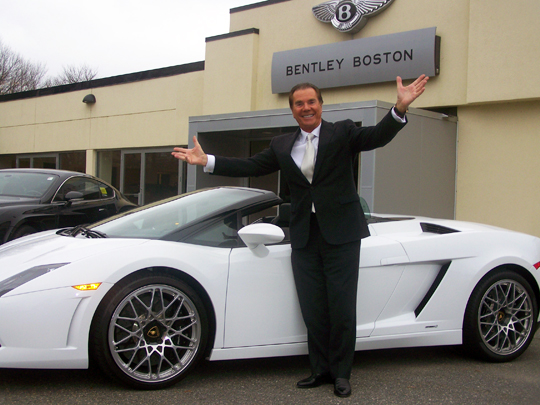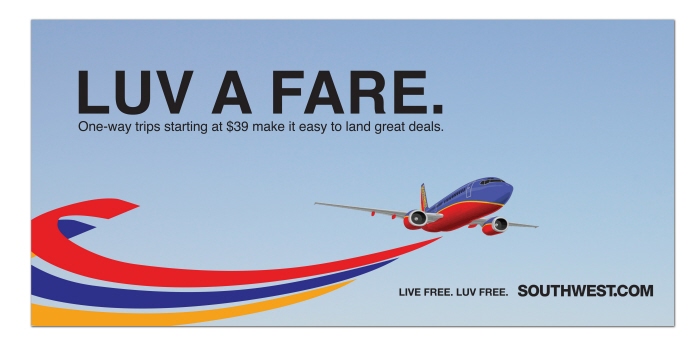Running an undifferentiated business is no fun. Sales are harder to come by, margins get squeezed, and growth stalls.
Winning is fun. Beating the snot out of your competition is fun. We need to have a way to stand out so we can dominate too!
The far majority of small businesses in America, and I imagine in many other places around the world, are service businesses that are very hard to tell apart.
Service businesses are great businesses to start because they typically require less cash investment and can start generating revenue almost immediately. And when they are differentiated, they can experience spectacular growth and dominate their market – Southwest Airlines being a perfect example.
Southwest has no technological advantage or patents that their competitors don’t have access to, and yet they have dominated the airline industry by having clear, powerful differentiation. Their obsession with ‘Luv’, and their ability to turn that into a business advantage, is why they are one of the companies I admire most.
‘Selling the Invisible’
But oftentimes service businesses in particular get stuck in a mode of not being differentiated from their competition in any substantial way. And I think the reason why is that many business owners don’t understand how to differentiate something isn’t tangible? If you have a physical product, it’s tangible. You differentiate it by the specific features or technology that’s in that product, the design of the product, the quality components of that product, how it’s manufactured, etc. Those things are all tangible and easy to understand.
But people struggle more with how to differentiate a service, which ends up costing them both in growth opportunities and profitability – as author Harry Beckwith explained perfectly in his classic book Selling the Invisible. In order to sell services effectively, you must learn to make the intangible tangible.
I have always really admired services businesses, and I enjoy studying how they differentiate. I think that has paid off in the service businesses I’ve built, which became service leaders in very competitive industries.
What I want to do is just share some ideas, specific ideas, on how you can differentiate a service and win.
Offer superior service.
The first and probably the most well known is just to offer a superior service. I think that that ends up being the default approach of service businesses that are trying to win – work harder, be better, etc. In order to differentiate, they think they just have to offer a superior service. What exactly that means in any given industry can be different but that, I think, is just kind of the default.
And there are businesses that have executed this very well. Nordstrom, is an example of retailer that provides a superior service and has differentiated themselves for decades on that. And you’ll find a version of this in every market you study, whether that’s the law firm, the real estate agent, the cleaners…every business has the company that has taken on the ‘superior service’ commitment.
And that is certainly one way to go about it, but it’s definitely not the only way, and if another business already has that reputation in your industry, it may not be a very good option for you.
Let me give you some additional alternatives.
Change the way you charge.
Another way to differentiate is to change how you charge. This is something that we did with our technology service business. The entire industry was charging hourly. We rolled out a flat-fee model where people paid us a monthly fee for essentially ‘all you can eat’ support of your technology. At the time, people thought we were crazy, but it differentiated us in the marketplace, and customers really responded.
Technically we were providing a nearly identical service to our competitors, but by changing how we charged, we created our own space in the marketplace.
Reduce risk.
Reducing risk is another way that you can differentiate. If you’re in a business where there’s a lot of perceived risk on the customer’s part, and you’re willing to stand behind your service and give them the option to not pay in advance or get a guaranteed refund, no question asked – then you can set yourself apart from the competition.
Zappos is the perfect example of this. By making it very, very easy to return a product, they were able to grow like crazy because women were no longer afraid of buying bad shoes online.
Own a specific attribute.
Volvo is safe. That’s what I mean by own an attribute. Volvo is safe. Mercedes is quality engineering. In every business, there are attributes of that product or service that are desirable to own (have strongly associated with your brand), and you can pick one and own it specifically by focusing all of your marketing messaging around your ownership of it.
In a service business, this could mean that you are the easiest, the fastest, the cheapest, the nicest to do business with, or just about anything else – as long as it’s meaningful to the customer it can work wonders for you.
Be a leader.

Being a leader is a way to differentiate. Being the first the do to something. Being the top selling. Being the biggest. That position of leadership can be owned. And that’s something that’s very well respected, particularly in the United States, in terms of branding. If you have ever lived in the Boston area, you know that Herb Chambers is the #1 car dealer by far in New England. It’s impossible to miss the fact, because they remind you in their marketing all the time. And why not, it’s great branding?
Be a specialist.
Being a specialist in a particular niche or skill is one of the best ways to differentiate, giving you the ability to tailor your marketing message and command higher prices for your services. It’s getting harder and harder to use this one effectively these days though; it’s an approach that’s been used by so many already that you have to get more creative to find the opportunity to really stand out.
Differentiate based on origin.
Demonstrating differentiation based on origin or where your service comes from, your background story, your origin story, how you got into that business, how you started doing what you do. We can all think of businesses that we connect to because of some sort of origin story of the founder that is meaningful to us. And that we end up developing a preference just for that story alone, that brings us back to that service over and over again.
Do the opposite.

It tends to be that in a lot of industries there is kind of a pack mentality where, again, businesses don’t differentiate. They all start to look alike. They all start to go in one particular direction. And oftentimes, just by going in the opposite direction you can differentiate yourself and create a real competitive advantage. Southwest Airlines is the classic example of this in that they went against an industry that was deeply entrenched in a certain way of doing things – food service, lounges, and hub-and-spoke flight distribution. Southwest Airlines went in it at a completely opposite direction and ended up dominating the industry.
Associate a personality to the company.
This is one of the easiest and most effective ways to differentiate a service business, and one of the most popular in the era of social media. As long as the personality is a strong one that is comfortable being in the public eye, it can be a very powerful model. Virgin‘s Richard Branson is the perfect example of a company that has leveraged the personality of the founder to differentiate.
Additional resources.
If you’d like to do some more study on this topic, here are a few of my favorite resources:
If you’re running a service business, I rank all three of those books as some of the most important you’ll read. Get them!
Whatever you do…differentiate!
Finding a way to differentiate is hard work, but it’s the most important work you’ll do at your business, so you must make time to figure it out! An undifferentiated business is left to pick up the scraps in the marketplace from the winners…not a place you want to be.
Work hard to differentiate your service and leave your competition wondering why you are beating them so badly!
All the best,
Mike Cooch
PS – If you’d like to discuss this topic, or anything else associated with building a business, please be sure to join our Facebook Group. It’s full of great entrepreneurs that can help you, and I’m in there every day!


